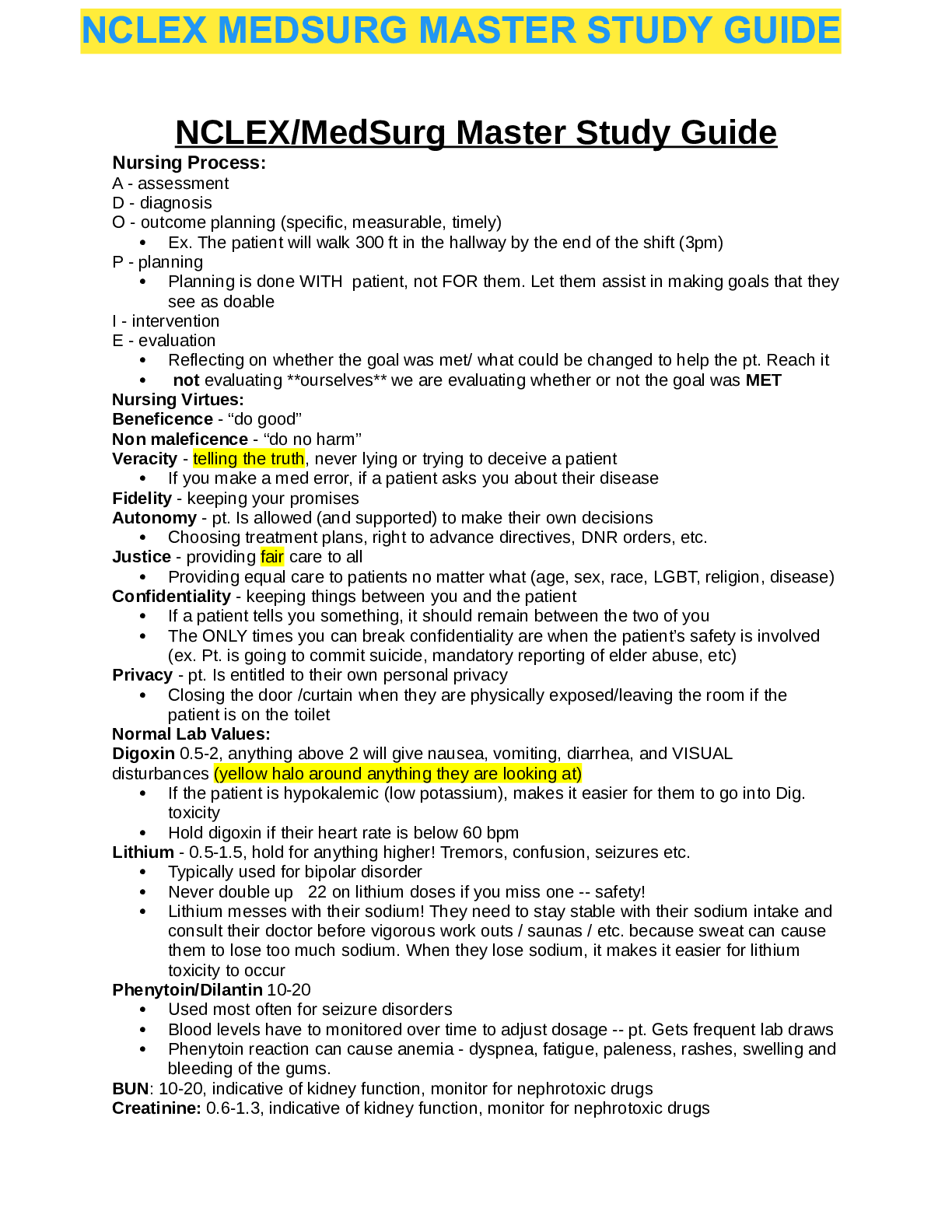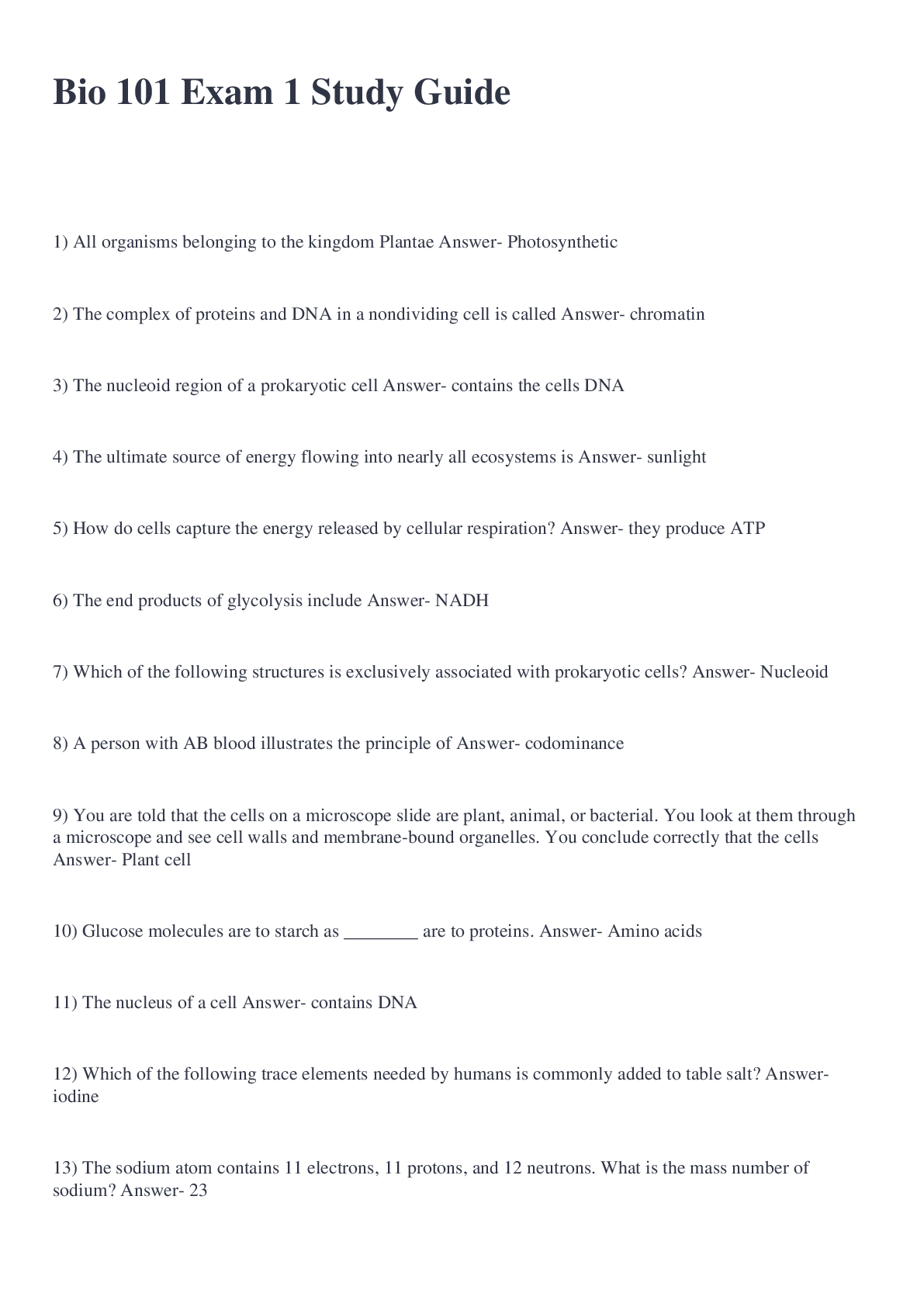*NURSING > STUDY GUIDE > BIO 2020 103 NCLEX/MedSurg Master Study Guide/BIO 2020 103 NCLEX/MedSurg Master Study Guide (All)
BIO 2020 103 NCLEX/MedSurg Master Study Guide/BIO 2020 103 NCLEX/MedSurg Master Study Guide
Document Content and Description Below
Nursing Process: A - assessment D - diagnosis O - outcome planning (specific, measurable, timely) Ex. The patient will walk 300 ft in the hallway by the end of the shift (3pm) P - planning �... �� Planning is done WITH patient, not FOR them. Let them assist in making goals that they see as doable I - intervention E - evaluation Reflecting on whether the goal was met/ what could be changed to help the pt. Reach it not evaluating **ourselves** we are evaluating whether or not the goal was MET Nursing Virtues: Beneficence - “do good” Non maleficence - “do no harm” Veracity - telling the truth, never lying or trying to deceive a patient If you make a med error, if a patient asks you about their disease Fidelity - keeping your promises Autonomy - pt. Is allowed (and supported) to make their own decisions Choosing treatment plans, right to advance directives, DNR orders, etc. Justice - providing fair care to all Providing equal care to patients no matter what (age, sex, race, LGBT, religion, disease) Confidentiality - keeping things between you and the patient If a patient tells you something, it should remain between the two of you The ONLY times you can break confidentiality are when the patient’s safety is involved (ex. Pt. is going to commit suicide, mandatory reporting of elder abuse, etc) Privacy - pt. Is entitled to their own personal privacy Closing the door /curtain when they are physically exposed/leaving the room if the patient is on the toilet Normal Lab Values: Digoxin 0.5-2, anything above 2 will give nausea, vomiting, diarrhea, and VISUAL disturbances (yellow halo around anything they are looking at) If the patient is hypokalemic (low potassium), makes it easier for them to go into Dig. toxicity Hold digoxin if their heart rate is below 60 bpm Lithium - 0.5-1.5, hold for anything higher! Tremors, confusion, seizures etc. Typically used for bipolar disorder Never double up 22 on lithium doses if you miss one -- safety! Lithium messes with their sodium! They need to stay stable with their sodium intake and consult their doctor before vigorous work outs / saunas / etc. because sweat can cause them to lose too much sodium. When they lose sodium, it makes it easier for lithium toxicity to occur Phenytoin/Dilantin 10-20 Used most often for seizure disorders Blood levels have to monitored over time to adjust dosage -- pt. Gets frequent lab draws Phenytoin reaction can cause anemia - dyspnea, fatigue, paleness, rashes, swelling and bleeding of the gums. BUN: 10-20, indicative of kidney function, monitor for nephrotoxic drugs Creatinine: 0.6-1.3, indicative of kidney function, monitor for nephrotoxic drugs [Show More]
Last updated: 2 years ago
Preview 1 out of 35 pages

Buy this document to get the full access instantly
Instant Download Access after purchase
Buy NowInstant download
We Accept:

Reviews( 0 )
$12.00
Can't find what you want? Try our AI powered Search
Document information
Connected school, study & course
About the document
Uploaded On
Sep 30, 2022
Number of pages
35
Written in
Additional information
This document has been written for:
Uploaded
Sep 30, 2022
Downloads
0
Views
45

 (1).png)



